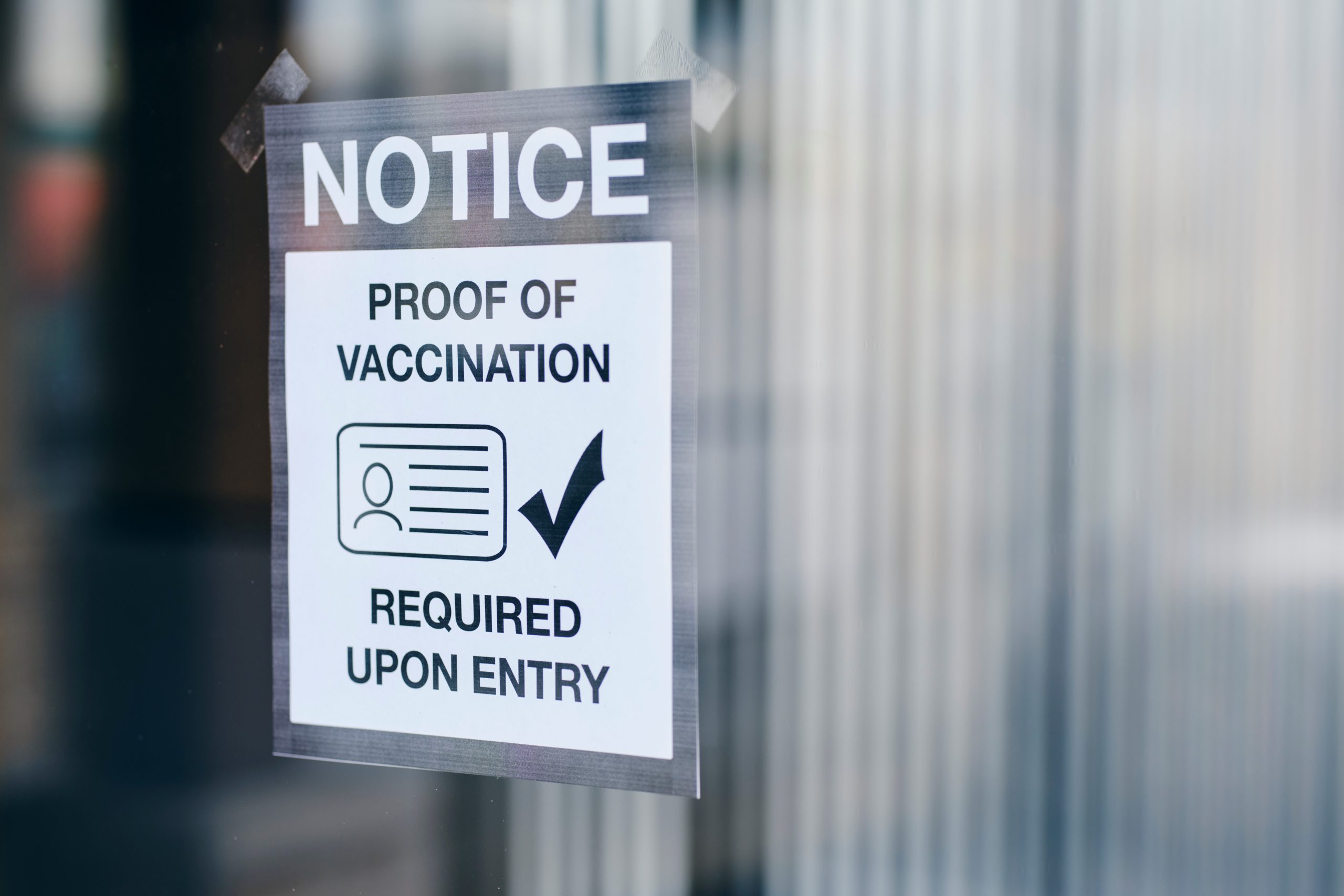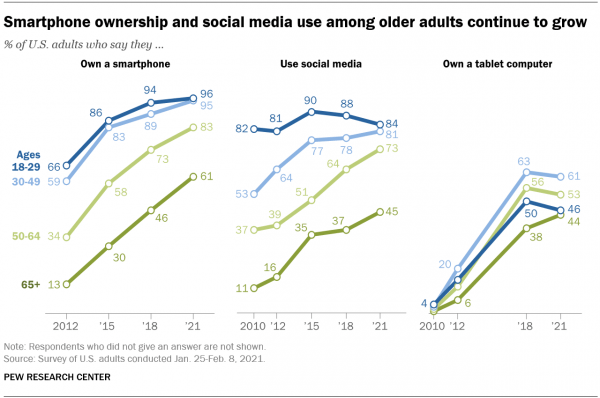SCOTUS blocks Biden’s vaccine mandate, Buckingham Palace issues terse statement on Prince Andrew and older adults power up their smartphones
Also: Minor league baseball’s Portland Pickles shares NSFW tweet, Microsoft announces review of sexual harassment protocols and more.

Hello, communicators:
A minor league baseball team from Oregon made waves on Twitter this week when it shared a photo of its mascot, a life-sized pickle, in what appeared to be a rather compromising position.
We have ended our mascot takeover. It’s come to our attention that this photo can be misinterpreted as a disturbing image. Dillon would like to go on record and say that he was trying to give his fans a thumbs up. https://t.co/5VUgkhieq2
— Portland Pickles (@picklesbaseball) January 12, 2022
In the space of just eight minutes, the Portland Pickles announced that Dillon T. Pickle would be taking over the account, Mr. Pickle tweeted the offending image of his…thumb (?) and the team announced the end of the mascot takeover.
Yet, the seeming misfire has some questioning whether the raunchy tweet was actually an accident. As evidence, accounts tagged in the offending photo include personal grooming company Manscaped, California State Sen. Scott Weiner (D) and a person named Justin Dickmeyer.
The team tweeted that they would share the results of an “investigation” into the situation later today, so keep your eye on their Twitter feed for more NSFW social media marketing.
Here are today’s other top stories:
Nation’s highest court strikes down Biden’s vaccine rules for employers
The U.S. Supreme Court on Thursday blocked enforcement of President Joe Biden’s mandate for employers with 100 or more workers—but allowed a similar rule for healthcare workers to remain.
Companies affected have been mostly silent since the decision, but some have released statements about how their workers might be affected by the ruling. Target told ABC News that its leaders “wanted to review the decision and ‘how it will impact our team and business.’”
Sarah Wechter, head of human resources for Citigroup, shared in a LinkedIn post that Citi’s vaccine mandate has not changed:
Many larger companies were using the weight of the federal vaccine mandate to back their own jab compliance policies. Now that the decision has been struck down, communicators must consider their organizations’ stance: Do you have a mandate that you’re sticking with? Is your lack of a mandate now legal? Keep in mind that any internal messaging will likely be shared externally—and picked apart by critics and supporters alike.
In addition to a mandate, communicators could also consider financial incentives to get the vaccine or consequences for unvaccinated workers who contract the virus.
MEASURED THOUGHTS
A new report from the Pew Research Center shows that smartphone and social media use among Americans aged 65 and older has been increasing since the early 2010s.

Sixty-one percent of older adults surveyed in 2021 now say they own a smartphone, up from a meager 13% in 2012. And while younger demographics are less and less likely to use social media (down six percentage points since 2015), 45% of those 65+ say they’re using social media sites and apps today.
Communicators, take note: While it’s tempting to lean into the Gen Z/Millennial voice in social media and online marketing, remember that your audience might be older than you think.
Check out more from the Pew Research Center study here.
TAKE OUR SURVEY
If you’re looking to further your understanding of your industry to navigate what’s ahead in 2022, lend us a hand—and help yourself and your peers identify shared benchmarks in areas such as budgets, team structure, ESG and DE&I efforts, and more. Participate in Ragan Communications Leadership Council’s 2022 Benchmark Survey, a comprehensive look at how to negotiate budgets with your executives, how to best reach deskless workers and foster culture among a hybrid workforce, and more.
Both internal and external communicators are encouraged to participate.
By taking part, you’ll be entered to win one of three $100 gift cards. All who complete the survey will receive a full report on the findings. Responses are anonymous.
Survey takers will receive an executive summary of the findings.
Microsoft promises review of sexual harassment policies
The software and cloud computing giant is taking another look at how it handles reports of sexual misconduct in the workplace. The board of directors announced the review, along with a report due in the spring, following a vote from shareholders supporting action.
CEO Satya Nadella first addressed the company’s record on sexual harassment last May after reports of founder and former CEO Bill Gates pursuing a sexual relationship with an employee in 2000. Gates left Microsoft’s board in 2020.
“Our culture remains our number one priority and the entire board appreciates the critical importance of a safe and inclusive environment for all Microsoft employees,” Microsoft CEO Satya Nadella said in a statement.
“We’re committed not just to reviewing the report but learning from the assessment so we can continue to improve the experiences of our employees. I embrace this comprehensive review as an opportunity to continue to get better.”
What you should know: While the #MeToo movement can feel like old news after the twists and turns of the COVID-19 crisis, many organizations still have a lot of work to do to create a safe environment for all employees. As organizations try to send a message about their care for workers, third-party review can be essential in reestablishing trust.
It will be up to Microsoft to demonstrate how the forthcoming report changes its culture—and offer clear action steps for what comes next for the tech giant.
Announcing the PR Daily Leadership Network
PR Daily is launching the PR Daily Leadership Network, a unique membership group from Ragan Communications offering peer-to-peer advisory and team training along with a unique slate of resources and events to help public relations professionals break through the noise, increase their visibility and forge meaningful connections.
The Network provides daily insights and coverage on a range of topics including media relations, social media, measurement, Diversity, Equity & Inclusion, branding, thought leadership and crisis communications.
“The fast pace of change coupled with the demand on public relations professionals to protect and sometimes defend their company’s reputation make it imperative for leaders to tap into the wisdom of other communicators and continue to learn and grow,” says Diane Schwartz, CEO of Ragan Communications. “The PR Daily Leadership Network provides the answers but also encourages members to question the status quo and push for positive change.”
Visit leadership.prdaily.com to learn more.
Buckingham Palace strips Prince Andrew of royal, military titles amid U.S. sexual assault lawsuit
The U.K. Royal Family announced Thursday that Prince Andrew, formerly known as the Duke of York, will no longer be referred to as His Royal Highness in an official capacity.
The notably terse press release from the palace is as follows:
With The Queen’s approval and agreement, The Duke of York’s military affiliations and Royal patronages have been returned to The Queen.
The Duke of York will continue not to undertake any public duties and is defending this case as a private citizen.
Virginia Giuffre alleges in a civil lawsuit in New York that she was forced to perform sex acts with Prince Andrew while she was underage as a result of being trafficked by convicted sex offender Jeffrey Epstein. Earlier this week, a New York judge allowed the case to move forward, ruling against a motion by Prince Andrew’s lawyers to dismiss it.
Buckingham Palace previously denied the allegations in a statement to CNN in 2019:
It is emphatically denied that The Duke of York had any form of sexual contact or relationship with Virginia [Giuffre]. Any claim to the contrary is false and without foundation.
Why it matters: When it comes to publicly addressing crises, the Royal Family has had plenty of practice over the years. The superbly short statement from Buckingham Palace regarding the changes to Prince Andrew’s public role is in keeping with its tradition for silence and understatement. It’s a clear model for other organizations who have to separate the health of the organization from a former employee or figurehead that poses a reputational threat.
As Shakespeare wrote: Brevity is the soul of wit. It’s also essential in good crisis messaging, when there’s nothing else to say.









What’s happening to Prince Andrew and Microsoft could be happening to us.
His former highness is accused of many years ago having sex with a 17 year old. My alma mater, Penn, has 24,800 students. If even 10% while in four years of high school and years of college had relations with a 17-year-old, should 2,480 Penn students be thrown out of school, sued or jailed?
Microsoft has 108,000 employees. If even 1% of them have ever done flirting and could therefore be called “sexual predators,” should over 1,000 Microsoft employees be fired plus perhaps sued and jailed?
How about you—should “tax the rich” proposals require you to pay more taxes? We can see online that over 90 million Americans earn less than $25,000 a year. But 21% of us earn $50,000 to $100,000 a year, and fewer than 7% of us get $75,000 to $100,000. So should 21% of us, or at least 7%,
pay a lot more taxes so the 90 million can pay less?
Jeff Bezos is faulted for having $150 billion, and Mark Zuckerberg doesn’t take busses to hold down expenses, but do we encourage our kids to study and work hard so they can enjoy success? Should we or our kids draw the line at some point and say “no more” to additional income or savings?
Corporations are faulted for earning “so many billions” and we in PR may be asked why we willingly work for such companies. Companies take available tax deductions, as most of us do, to pay as little as possible in taxes. But does taking all possible tax deductions make companies or individuals guilty? Or should our government provide fewer deductions for investing in technology, equipment and factories that help create American jobs?
Perhaps there’s too much blame of the rich although most of us would rather
be rich than poor. Some of the blame companies bring on themselves by not sponsoring some huge health protection project–earning public adoration–like sponsoring the hunt for a cancer vaccine, or pills to slow down aging, or more plastic parts for human hearts. The more heroic a company looks to the public, the more the company is likely to sell and the safer it will be in Washington.
A program to find a cancer vaccine, anti-aging pills or plastic parts for hearts could not only earn affection from 150 million Americans but PRAYERS from millions of them. PR can do this.
Yet we look at the troubles of Prince Andrew and Microsoft like what the hell, they’re so rich it doesn’t matter. We fault drug companies for charging so much but without being grateful enough that they help us live ten or 20 years longer than we’d make it without them.
PR can help correct the lack of appreciation so we in PR should be glad for what we do. Perhaps we have right to be proud and not ashamed even if like companies we try to improve ourselves as by joining things like PR Daily’s Leadership Roundtable, taking the crisis PR courses, studying client needs on our own time, and not feeling guilty or depressed even if years ago we dated a 17-year-old.
What’s happening to Prince Andrew and Microsoft could be happening to us.
His former highness is accused of many years ago having sex with a 17 year old. My alma mater, Penn, has 24,800 students. If even 10% while in four years of high school and years of college had relations with a 17-year-old, should 2,480 Penn students be thrown out of school, sued or jailed?
Microsoft has 108,000 employees. If even 1% of them have ever done flirting and could therefore be called “sexual predators,” should over 1,000 Microsoft employees be fired plus perhaps sued and jailed?
How about you—should “tax the rich” proposals require you to pay more taxes? We can see online that over 90 million Americans earn less than $25,000 a year. But 21% of us earn $50,000 to $100,000 a year, and fewer than 7% of us get $75,000 to $100,000. So should 21% of us, or at least 7%,
pay a lot more taxes so the 90 million can pay less?
Jeff Bezos is faulted for having $150 billion, and Mark Zuckerberg doesn’t take busses to hold down expenses, but do we encourage our kids to study and work hard so they can enjoy success? Should we or our kids draw the line at some point and say “no more” to additional income or savings?
Corporations are faulted for earning “so many billions” and we in PR may be asked why we willingly work for such companies. Companies take available tax deductions, as most of us do, to pay as little as possible in taxes. But does taking all possible tax deductions make companies or individuals guilty? Or should our government provide fewer deductions for investing in technology, equipment and factories that help create American jobs?
Perhaps there’s too much blame of the rich although most of us would rather
be rich than poor. Some of the blame companies bring on themselves by not sponsoring some huge health protection project–earning public adoration–like sponsoring the hunt for a cancer vaccine, or pills to slow down aging, or more plastic parts for human hearts. The more heroic a company looks to the public, the more the company is likely to sell and the safer it will be in Washington.
A program to find a cancer vaccine, anti-aging pills or plastic parts for hearts could not only earn affection from 150 million Americans but PRAYERS from millions of them. PR can do this.
Yet we look at the troubles of Prince Andrew and Microsoft like what the hell, they’re so rich it doesn’t matter. We fault drug companies for charging so much but without being grateful enough that they help us live ten or 20 years longer than we’d make it without them.
PR can help correct the lack of appreciation so we in PR should be glad for what we do. Perhaps we have right to be proud and not ashamed even if like companies we try to improve ourselves as by joining things like PR Daily’s Leadership Roundtable, taking the crisis PR courses, studying client needs on our own time, and not feeling guilty or depressed even if years ago we dated a 17-year-old.